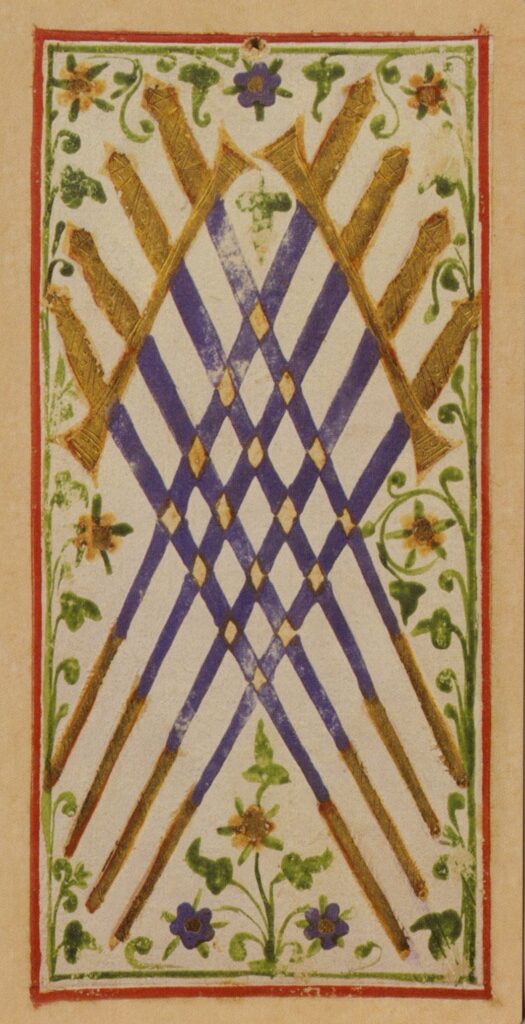The Eight of Swords rises in the sequence like a lattice of thought that has forgotten the song of its Source. Eight is the double of four, the square multiplied, the fixed order reiterated until it becomes a prison. The figure stands bound, eyes veiled, surrounded by the vertical blades of the intellect, each one a voice in the chorus of the mind and yet lacking the unity of the Word. In the golden frame of astrological correspondences, this is the first decan of Gemini under the governance of Jupiter; an air of multiplicity swelled by the planet of expansion, producing an atmosphere of restless division. It is the quicksilver of speech meeting the largesse of a scribe who never ceases to write; scroll after scroll until the reader can no longer remember the first line.
This is the danger of the first emanation untempered, the Logos refracted through too many mirrors. The Desert Fathers spoke of the logismoi, those wandering thoughts that multiply within the heart like uninvited guests; to entertain them all is to lose the still point, to see the house filled with movement yet empty of its Lord.
I. The Multiplicity of the First Decan
The One overflows and the overflow is the Many. However, the Many, without recollection of the One, becomes noise. Gemini holds the mystery of the twin, the image and its double, the conversation within the soul. In its first decan, the sign opens the gate to multiplicity with the delight of a child discovering words; Jupiter, arriving as guest, brings abundance and breadth, and the chamber is soon crowded. The swords are thoughts in bright metal, each reflecting the next, a ring of reflections without an original.
The Book of Ecclesiastes warns of this in the preacher who declares all to be vanity when multiplied without measure. The Gnostic gospels echo it, describing aeons that, when they forget the pleroma, wander in their own power until their movement becomes a labyrinth. The Eight of Swords captures that moment when the labyrinth ceases to be a path of wonder and becomes a holding cell. Procession must be followed by return; the spiral back to the source is the antidote to the rigid circle that turns upon itself without ascent. Without that return, multiplicity becomes a closed dance that feeds upon its own shadow.
II. The Logismoi and the Tribulation of the Mind
As recorded by Evagrius and the hesychast tradition, the logismoi are movements of the heart that clothe themselves in thought. They arrive in swarms, each promising clarity, demanding a share of attention. But, when all are entertained, the soul becomes like the Eight of Swords, hemmed in by the very faculties meant for its liberation. In the Psalmist’s voice, this is the moment when deep calls to deep, but the surface is stirred by too many winds.

The swords stand for the cutting capacity of discernment; but, multiplied without the discernment of discernment, they divide until nothing whole remains. Like the house with many angles, the mind holds dust in all corners. In Orthodox hymnody, the Mother of God is addressed as the one who straightens the crooked and makes the barren bear fruit; she holds the Child at the centre, a visible reminder of the axis about which all must turn. The Eight of Swords is the image of that same house before the icon is set in place; its corners are empty, its walls speak to one another without hearing. The remedy is the same as the practice that answers the logismoi: to let the breath settle, to fix the gaze upon Christ until the multiplicity folds back into the single Light. The swords then become lines of psalmody, leading outward into the open air rather than fencing the soul in shadow.
Coda – Under Michael, Umabel, and Iahhel
Close the eyes and stand between two living pillars of light. See Michael before you, the sword in his right hand a flame that parts false thoughts from the mind, each stroke leaving only the path to the centre. Feel Umabel at your right, the angel of the first degrees of Gemini, guardian of friendship in the mind’s air, who teaches the right weaving of thoughts. Sense Iahhel at your left, keeper of the later degrees of the same decan, whose stillness makes the soul’s dwelling luminous; both are part of the Archangels within the ninefold choir, their wings calming the mutable winds so they serve ascent rather than distraction. Remain until the circle around you feels whole, the swords that once hemmed you now raised in your defence.
Fiat Lux.
